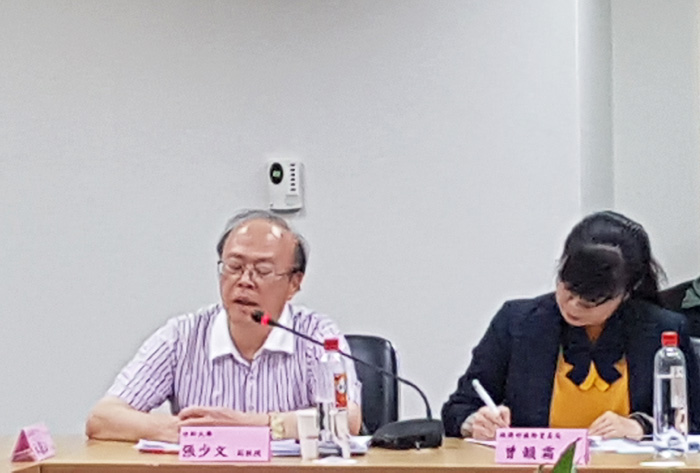|

Figure 1: Shih Hsin University Professor Chang Shao-wen (left) and Bureau of Foreign Trade Commerce Secretary Tseng Yun-shuang.
The ROC-ROK Culture Foundation held a conference in June of this year, in the wake of South Korea’s new president Moon Jae-in taking office the previous month and rising tension with North Korea. The conference was aimed at discussing the issues facing the Korean peninsula in coming years and what opportunities for cooperation exist between Taiwan and South Korea.
Taiwanese president Tsai Ing-wen launched the New Southbound Policy, a policy aimed at improving trade relations with ASEAN and South Asian countries, as well as Australia and New Zealand, on coming to power last year, but South Korea has already made significant inroads in the region, signing 15 FTA agreements with over 50 countries around the world, including ASEAN and India which are both major focuses of Taiwan’s policy. South Korea invested US$50 billion in Vietnam in 2016, according to the figures of the Korea Trade-Investment Promotion Agency (KOTRA). South Korea is also the only Asian country to have signed FTAs with the three largest global economies, the US, China and the European Union. It has another FTA with six countries from Central and South America pending congressional approval and four other FTAs in the negotiation stage. South Korea’s FTA roadmap was established during the tenure of the late former president Roh Moo-hyun and the country’s FTAs cover 73% of its foreign trade, second only to Chile’s coverage of 78%. Can closer partnerships with South Korean companies then allow Taiwanese firms to benefit from these FTAs and to make progress in increasing trade with Southeast and South Asia?
The bilateral trade volume between South Korea and Taiwan totaled US$27.4 billion in 2016, with growth of 7.33% from 2015 to 2016 and 22.87% year-on-year growth in the first quarter of 2017. South Korea is Taiwan’s 5th largest trade partner, and Taiwan is South Korea’s 6th largest. Taiwan imports from South Korea totaled US$14.6 billion in 2016, whereas Taiwan exports to South Korea totaled US$12.8 billion in the same year. South Korea accounts for around 5% of Taiwan’s foreign trade.
South Korea’s GDP saw growth of 2.8% in 2016. The country’s top 10 foreign trade partners are: China, the US, Japan, Vietnam, Hong Kong, Taiwan, Germany, Australia, Saudi Arabia and the Marshall Islands.
Kim Jong-un assumed the title of supreme leader of North Korea after his father’s funeral in 2011. His leadership of the country has seen widespread purges of the country’s leadership, most notably the execution of his uncle Jang Song-thaek, who was widely perceived to favor pushing for closer relations with China. North Korea has recently suggested that they wish to exclude China from talks with the new US administration, after the election of Donald Trump to the presidency last year.
The chair of the ROC-ROK Culture Foundation Lin Chiu-shan stated that much of the newspaper coverage at the time of Kim’s succession had predicted that Kim would be unable to take control of the nation, due to his lack of influence with the armed forces and his reputation for promiscuousness, heavy drinking and his rumored heart problems. Even when he did assume power, at a conference in South Korea, many experts expressed the belief that he would not be able to last 2 years as supreme leader. However, Lin stated that Kim has survived and is now engaged in a power struggle with Trump, which suggests he should not be underestimated in this regard.
North Korea has carried out missile tests at least nine times already this year, heightening tensions worldwide.
The chair of the Chinese National Federation of Industries, Tsai Lien-sheng compared the situation of the two Koreas to Taiwan’s relationship with China, whilst conceding that unlike North and South Korea, Taiwan had already established relatively positive economic relations with China despite political tensions, with China accounting for 40% of Taiwan’s trade and 60% of Taiwanese overseas investment bound for China.
He added that Taiwan and South Korea are often considered to be competitors due to the big overlap in their industries. He also pointed to the major differences in the two economies, in that South Korea is dominated by big companies, whereas Taiwan’s business sector is mostly populated by small and medium-sized companies, which makes it more difficult for them to build their brands abroad as South Korean firms have done so successfully.
He stated that South Korea’s trade with Southeast Asia far outstrips Taiwan’s and expressed the hope that South Korea would cooperate in working with ASEAN countries.
Tseng Yun-shuang, the commercial secretary of Taiwan’s Bureau of Foreign Trade stated that South Korean investments in Taiwan in 2016 totaled US$1.2 billion and Taiwanese investment in South Korea totaled US$1.3 billion. She pointed to several instances of Taiwanese investment in South Korea, including Yuanta Financial Holdings’ US$250 million acquisition of a 50% stake in South Korea’s Tongyang Securities, Hon Hai’s US$360 million acquisition of a 4.9% stake in South Korea’s SK C&C, Fubon Financial’s US$200 million acquisition of a 48% share in Hyundai’s life insurance subsidiary and the US$20 million deal by which Taiwan’s Fair Friend Group acquired an 80% share in Korean machine tool manufacturer DMC.
The deployment of the THAAD missile defense system to South Korea has also raised tensions in the region, with a continuing Chinese boycott of South Korean goods. This has all come at a time of great political upheaval in South Korea, with the impeachment of former president Park Geun-hye and the subsequent election of a progressive candidate, Moon Jae-in, a former aide to the late former president Roh Moo-hyun.
Tseng stated that South Korean politics is generally divided into conservatives, such as Park Geun-hye, who are more focused on maintaining relations with the US, and progressives, who are in favor of repairing relations with North Korea.
Professor Chang Shao-wen of Shih Hsin University, a member of the Committee on Korean Relations, stated that Moon Jae-in faces several issues given his relative unpreparedness for the presidency. These range from filling ministerial positions and challenges to appointments already made, to unemployment, judicial reform, the continuing tensions with China over the deployment of the THAAD missile defense system and the potential for a renegotiation of the South Korean-US FTA (KORUS) under the Trump administration.
Chang stated that on June 29, President Moon is set to lead a delegation of fifty South Korean business people to the US to meet with Donald Trump, adding that there has been speculation that they are attempting to engage in gift basket diplomacy. Reports suggest that Moon will bring US$10 billion to buy US products, including energy resources. If it is an attempt to curry favor with Trump, it does not bear comparison with the US$100 billion arms deal made with Saudi Arabia, according to Chang.
In February of 2017, the number of unemployed in South Korea stood at 1,350,000 and by April it stood at 1,170,000. Moon intends to create 810,000 jobs in the public sector and 500,000 jobs in the business sector during his five-year tenure, according to Chang. South Korea’s Average National Income stood at US$27,580 in 2016. Moon has suggested that the government needs to take the lead in creating jobs. He will also raise the minimum wage, which currently stands at 1,610,000 won (US$1,414) a month, and will be raised to 2,500,000 won (US$2195) per month and hourly salaries from 6472 won (US$5.68) to 10,000 won (US$8.78). He has also suggested providing a fund to encourage SMEs to cooperate on R&D.
Moon has espoused the VISION 2030 initiative first proposed by Roh Moo-hyun. This ambitious plan is aimed at raising South Korea’s average national income to US$80,000 and pushing the country to the tenth in the global competitive index and the global quality of life index.
VISION 2030 comprises five main aspects:
- Expand growth potential
- Expand social capital
- Continue to push for globalization
- Improve the level of talent
- Improve the social welfare system
South Korea’s GDP could suffer to the tune of around 0.5% as a result of the THAAD issue with China, according to Chang, which could really cut into growth. South Korea’s chain of Lotte Supermarkets are being boycotted in China in protest against the deployment of the THAAD missile defense system, with many already having been forced to shut down. China has also reduced the number of tourists visiting South Korea, which has had an extremely negative effect on South Korea’s duty-free shops, as 64 out of every 100 customers were previously from China.
External Trade has been trending downwards, but the latest figures released show that in May exports totaled US$45 billion with imports at US$39 billion, said Tseng.
Exports to the US have fallen by 9% whereas exports to the Middle East have fallen 2.8%, but those to Vietnam increased by 57%, with ASEAN countries overall increasing by 36%. India has increased by 29%. Europe increased by 21%. So its growth is clear, despite slight reduction in the US, according to Tseng.
Trump has set a few nerves on edge, as he has referred to the KORUS FTA as a “job-killing deal”, and as “horrible” and “unacceptable” and has stated that he hopes to revisit it after dealing with the NAFTA agreement.
Tseng suggested that Taiwanese investors in South Korea take note of the following factors in considering an investment in South Korea:
- The labor policies of the new government
- Korea may adjust its taxes upwards for foreign enterprises as it reduced its corporation tax takings by 2.8 trillion won (US$16.7 billion) in the period from 2012 – 2015.
- Pick a good agent to ensure you’re well represented in the country.
- Enhance cooperation with Korean corporations as this will allow for more opportunities to compete for government contracts, as well as allowing you to benefit from South Korea’s extensive network of FTAs.
 |
|
| Author: |
Conor Stuart |
| Current Post: |
Senior Editor, IP Observer |
| Education: |
MA Taiwanese Literature, National Taiwan University
BA Chinese and Spanish, Leeds University, UK |
| Experience: |
Translator/Editor, Want China Times
Editor, Erenlai Magazine |
|
|
|
| Facebook |
|
Follow the IP Observer on our FB Page |
|
|
|
|
|
|

